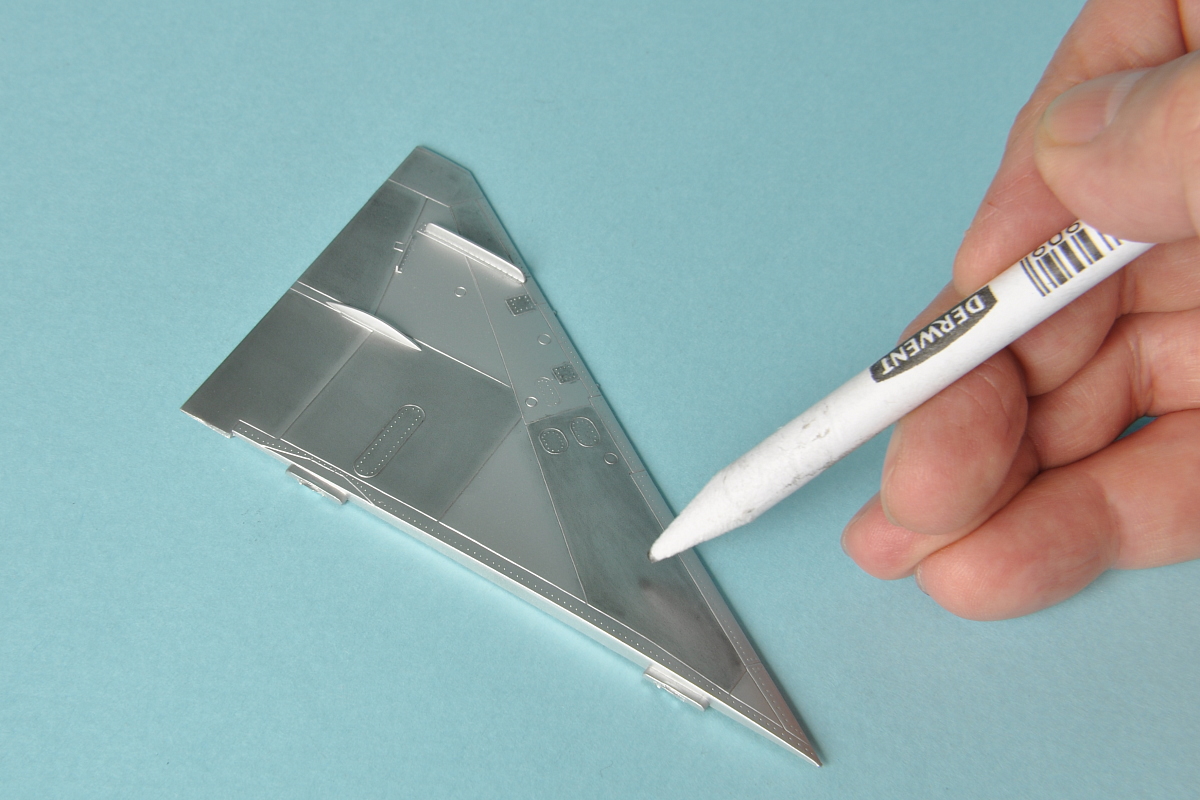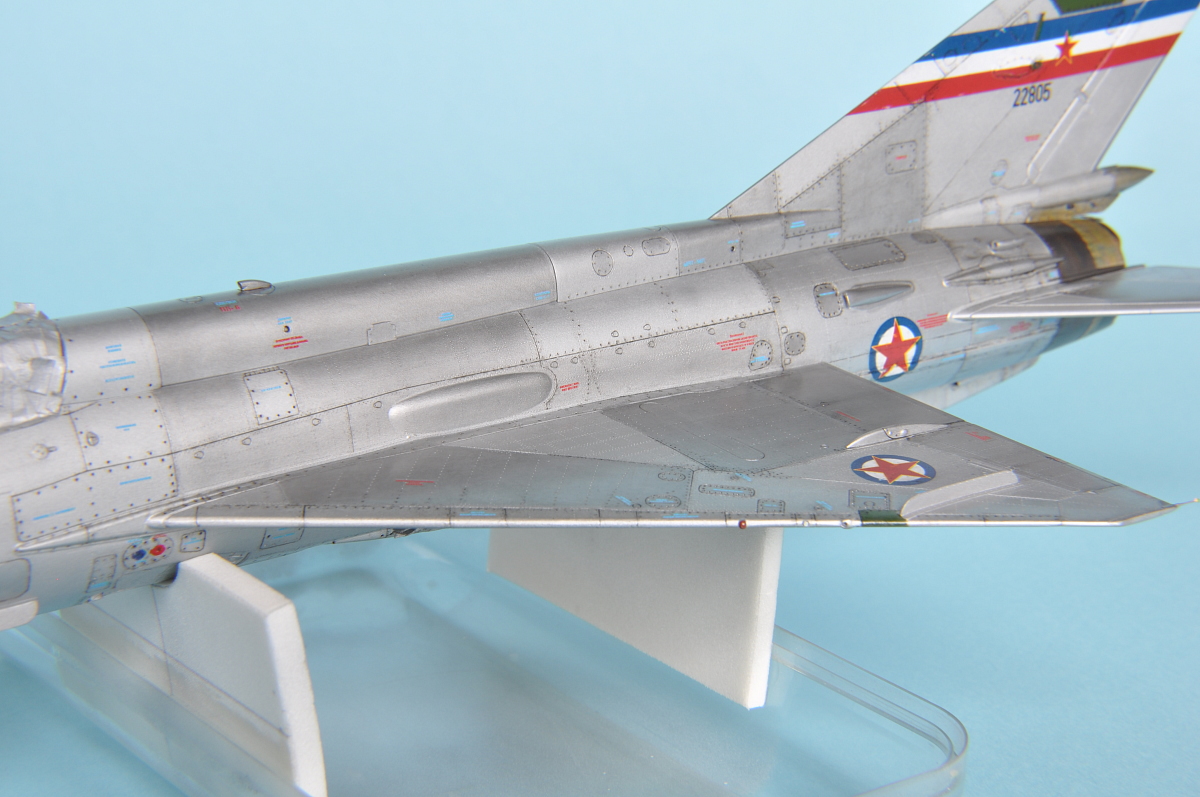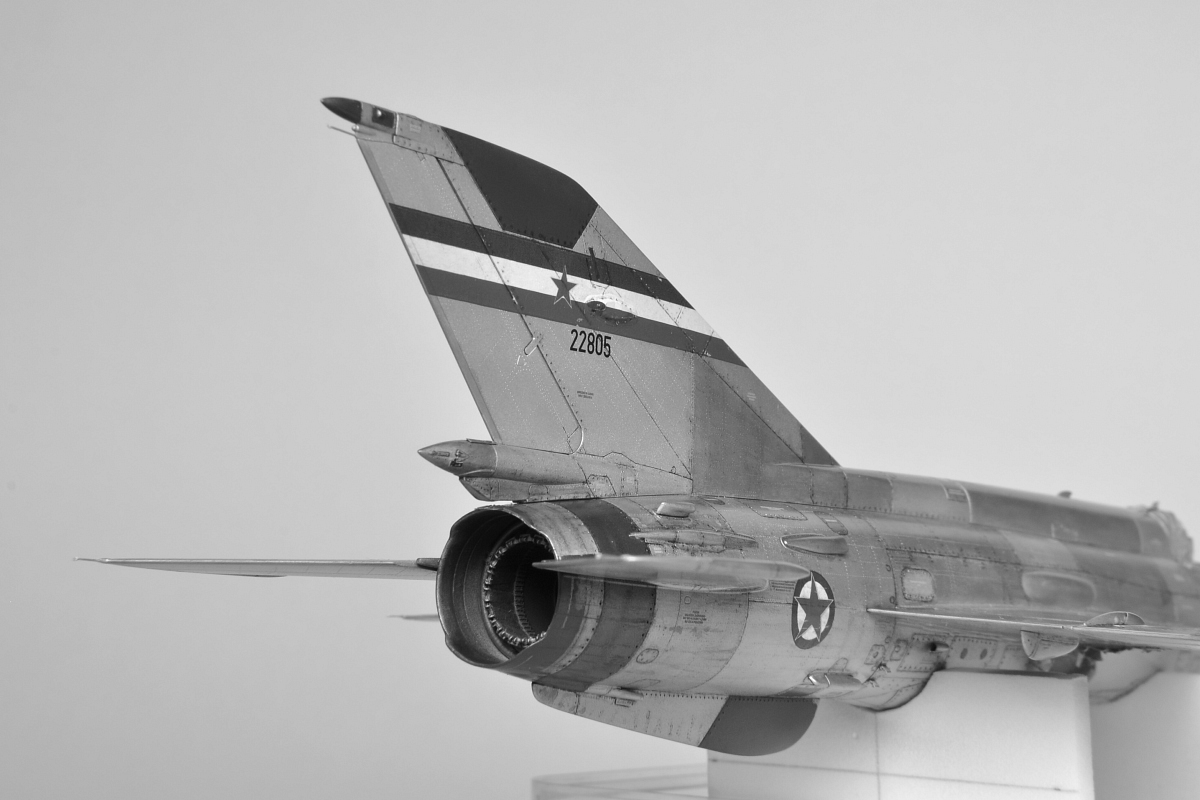Mig-21M
Jugoslovansko vojno letalstvo, št. 805 - Yugoslav Air Force
Eduard 1:48
14. BARVANJE - (PAINTING)
Maketo sem pobarval z barvo Model Master - aluminium plate metalizer, vendar barve nisem poliral, razen na oplati pred kabino letala. Kakšen dan sem počakal, da se je barva dobro posušila, nato pa semse lotil temnejših oplat. Te sem obarval tako, da sem grafitni prah črnega barvnega svinčnika enakomerno nanesel na izbrane površine. Za nanašanje sem uporabil slikarski papirni svinčnik za senčenje (blending stamp).
Vsa letala Mig-21 so bila v celoti
pobarvana. Zmotno, precej pogosto prepričanje je, da letalo ki ima naravni
kovinski sijaj, ni bilo pobarvano. Vsaj za Mig-21 to ne velja. Bili so
pobarvani z aluminijasto barvo in še polakirani. Tudi nekatere temnejše oplate
so bile pobarvane. Moja maketa Mig-a 21 naj bi predstavljala letalo ki je že
nekaj let v uporabi.
The biggest misconception about MIG-21s is
that the metal finish was not painted. Fact is, that all Mig-21s were painted
with aluminium color and a clear coat. Even some darker plates were painted. My
model is representing the Mig that has been used a few years. Maketo sem pobarval z barvo Model Master - aluminium plate metalizer, vendar barve nisem poliral, razen na oplati pred kabino letala. Kakšen dan sem počakal, da se je barva dobro posušila, nato pa semse lotil temnejših oplat. Te sem obarval tako, da sem grafitni prah črnega barvnega svinčnika enakomerno nanesel na izbrane površine. Za nanašanje sem uporabil slikarski papirni svinčnik za senčenje (blending stamp).
I painted my model with Model Master
aluminum plate metalizer, but I didn't polished it except on the plate right
before the cockpit. I waited for a day or so for the piant to dry, after that I
started with a darker plates. The dark plates were painted with a grafitti
black color pencil and carefully painted the chosen plates. For applying I used
the blending stamp that is used for the art.
For polishing I used the wool stick.
Trši kot je grafit (svinčnik H), svetlejša je površina in lažje je prah enakomerno nanašati in če hočemo tudi polirati.
Maketo sem nato polakiral s svetlečim lakom. Nespolirana aluminijasta barva z lakom nekoliko reagira in dobi sivkasti ton.
If you want brighter surface you need to
use harder graphite pencil(H), it's also easier to apply it in case you want to
polish the surface.
I painted the model with a clear coat. Unpolished aluminium paint gets a little grayer finish if you apply a clear coat over it.
I painted the model with a clear coat. Unpolished aluminium paint gets a little grayer finish if you apply a clear coat over it.
Zadnji del letala (izpušna šoba) je bil
prav tako pobarvan in ga lahko razdelimo na tri dele. Prvi del je enake barve
kot temnejše oplate letala. Drugi del sem pobarval z Burnt metal metalizerjem
(Model Master) in rjavim flomastrom. Na zadnjem delu sem uporabil aluminijasto
barvo (metalizer), polished steel (Humbrol), Revell prozoren rumen lak KLAR
730, grafitni prah in flomastre različnih barv.
The back part of the aircraft (exaust) was
also painted using three different color tones. The first part is the same
color as the darker plates on the aircraft. Second part was painted with a
Burnt metal metalizer (Model Master) and with a brown marker. On back part I
used aluminium metalizer paint, polished steel (Humbrol), Revell's yellow clear
coat Klar 730, graphite dust and all kinds of colorful markers.
15. NALEPKE - (DECALS)
Za drobne napise (stencile) sem uporabil
Eduardove napise iz kompleta v škatli in sicer tiste v ruščini (cirilici), saj
so jugoslovanski Migi drobne napise v domačem jeziku (srbohrvaščini) dobili
šele po prvem remontu.
Številko 805 na nosu letala sem sestavil iz več kompletov nalepk. Pri nameščanju številke je potrebno paziti da je le-ta poravnana s prednjimi vratci, ki so nagnjena in niso poravnana z vodoravno osjo letala. Zato gre številka navzgor proti kabini. To je značilnost vseh jugoslovanskih Migov in tudi nekaterih ruskih v primeru, da je bila serijska številka tik ob vratcih.
Številko 805 na nosu letala sem sestavil iz več kompletov nalepk. Pri nameščanju številke je potrebno paziti da je le-ta poravnana s prednjimi vratci, ki so nagnjena in niso poravnana z vodoravno osjo letala. Zato gre številka navzgor proti kabini. To je značilnost vseh jugoslovanskih Migov in tudi nekaterih ruskih v primeru, da je bila serijska številka tik ob vratcih.
For small stencils I used the Eduard's from
the kit (russian), because Yugoslavian Migs had a stencils in their Serbo-croatian
language after the overhaul.
The number 805 on the nose of the aircraft I assembled from many different kits of decals. You need to be really carefull with applying the nose numbers, because they need to be aligned with front nose doors and NOT aligned with horizontal axe of the aircraft, so the numbers goes up towards the cockpit. That is really common with Yugoslavian Migs and some of the russians aswell, that their serial numbers are right next to the doors.
The number 805 on the nose of the aircraft I assembled from many different kits of decals. You need to be really carefull with applying the nose numbers, because they need to be aligned with front nose doors and NOT aligned with horizontal axe of the aircraft, so the numbers goes up towards the cockpit. That is really common with Yugoslavian Migs and some of the russians aswell, that their serial numbers are right next to the doors.
Za zastavo na repu in kokarde sem uporabil nalepke Balkan Models-a. Rdeča in modra barva na teh nalepkah sta v pravi nijansi, glede na to da delam maketo rabljenega letala. Je pa nalepka zastave za ½ mm preozka.
For the tail flag and insignia I used the
Balkan models decals. Red and blue color of the set are perfect for my version
of ''used'' aircraft. The only problem is that the decal is ½ mm too narrow.
Uporabil sem AK-jev oil wash za natova
vozila, razredčenz razredčilom v razmerju 1:2. Na sprednjem delu trupa je bilo
ponavadi manj obrabe, več jo je bilo zadaj zaradi velikih temperatur motorja.
Pod krili, takoj za kolesnimi prostori, sta dva izpuha zaradi katerih je bil
zadnji del trupa tudi umazan.
I used the AK Oil wash for Nato tanks
thinned with thinner in 2:1 ratio. On the lower side of the body I did a light
weathering, the heavier weathering I did on the back beacuse of the high
temperatures on the real aircrafts. Beneath the wings in the wheels area there
were 2 exhausts, so that means that the back of the body was also dirty.
On wings I highlighted the bolts and
rivetts around the attachment spots.
For highlighting the service plates I used
the biggest amount of Oil wash.
17.OSTALI DETAJLI - (OTHER DETAILS)
Obroč na nosu letala (del C53) sem pobrusil
z notranje strani, tako da je sprednji rob tanjši. Pobarval sem ga z Burnt Metal
metalizerjem in potemnil z grafitnim prahom.
The nose ring(C53) part was grinded from
the inner side, so the front edge is thinner. For painting I used Burnt metal
metalizer and darkened it with graphite dust.
Sprednjo oplato pred kabino sem spoliral, ker je imela drugačen sijaj od ostalega letala, ni pa bila pobarvana kot temnejše oplate.
I polished the plate in front of the
cockpit because of different shine as for the rest of the plane, but was not
painted like the darker plates.
On the breaking parachute storage there are
service plates that were sratchbuilt.
Na konicah odvajalcev statične elektrike so plastični stožci, ki sem jih naredil iz barve. Ko se je barva posušila sem jo pobrusil v pravo obliko.
On the ends of the anti-static drains there
are plastic cones, that were made with paint. When they dried I grinded it to
get the real shape.























































Ni komentarjev:
Objavite komentar